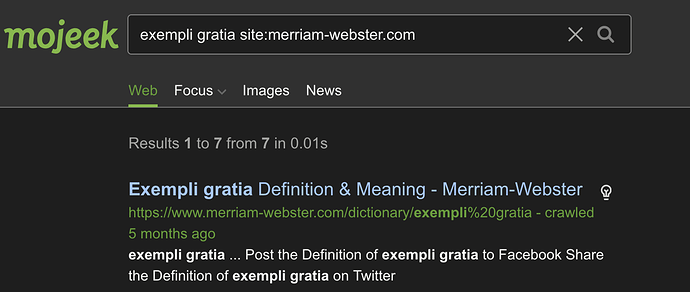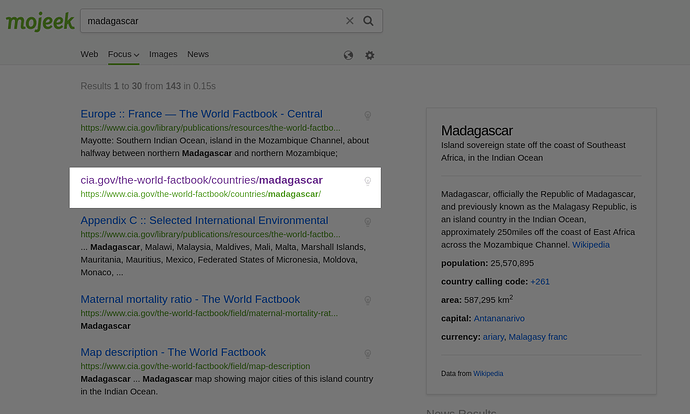Examples of Index Quality
PowerShell
I frequently reference the syntax and usage for PowerShell cmdlets at microsoft.com.
I set up this Focus Engine for PowerShell Docs.
{"PwshDocs":"i=docs.microsoft.com"}
Below is an example of a page I might visit. This one is for the Get-ChildItem cmdlet.
This is what I would expect to see as the first result. This is what will help me while I am working on a scripting problem. This is the official documentation for a commercial software product.
https://docs.microsoft.com/en-us/powershell/module/microsoft.powershell.management/get-childitem?view=powershell-7.2
If I search for “get-childitem” using my Focus Engine, here are the top three results.
powershell - Get-ChildItem | Copy-Item - Server
https://serverfault.com/questions/1055051/get-childitem-copy-item
Computers = hostname get-psdrive -PSProvider " FileSystem " ` | foreach
{Write-Output $Computers $_.Root;get-childitem $_.Root -include ...
Get-ChildItem gci - PowerShell - SS64.com
https://ss64.com/ps/get-childitem.html
By default, Get-ChildItem gets only non-hidden items, use the -Force
parameter to include both hidden and non-hidden items in the results.
colors - Powershell: Properly coloring
https://stackoverflow.com/.../.../powershell-properly-coloring-get-...
... Get-ChildItem $args " ) | ForEach-Object { if ($_.GetType().Name -eq
'DirectoryInfo') { $Host.UI.RawUI.ForegroundColor = 'Magenta' echo $_ ...
At the moment, it does not look like my “Sites to Search” are being respected.
But here is a typical example I was seeing before.
One way to make sense of these results is to ask yourself which one would you click on. Here, I don’t see anything related to my search.
Download tools from NuGet (Developer Guide for
https://docs.microsoft.com/en-us/dynamics365/customerengagement/on-premises/developer/download-tools-nuget
... Get-ChildItem ./Tools | Where-Object {$_.Name -match
'Microsoft.CrmSdk.XrmTooling.PackageDeployment.Wpf.'} move
.\Tools\$pdFolder\tools\*.* ...
Download tools from NuGet (Microsoft Dataverse) -
https://docs.microsoft.com/en-us/power-apps/developer/data-platform/download-tools-nuget
... Get-ChildItem ./Tools | Where-Object {$_.Name -match
'Microsoft.CrmSdk.CoreTools.'} move
.\Tools\$coreToolsFolder\content\bin\coretools\*.* ...
Télécharger les outils depuis NuGet (Microsoft
https://docs.microsoft.com/fr-fr/powerapps/developer/data-platform/download-tools-nuget
... Get-ChildItem ./Tools | Where-Object {$_.Name -match
'Microsoft.CrmSdk.CoreTools.'} move
.\Tools\$coreToolsFolder\content\bin\coretools\*.* ...
There are a few problems here.
- I don’t have the result I am looking for.
- There are results in a foreign language.
- I have no way to ask Mojeek to specifically search
https://docs.microsoft.com/en-us/powershell/
If I manually add the language parameter &lr=EN, that improves the results by limiting them to microsoft.com/en-us/. But I still don’t have the Docs article I am looking for.
Merriam-Webster
I look up spellings and definitions using the US English language dictionary Merriam-Webster.
I set up this Focus Engine for Merriam-Webster.
{"Define":"i=merriam-webster.com"}
Here is an example of a page I might visit. This one is for the definition of the word “prose”.
https://www.merriam-webster.com/dictionary/prose
If I search for
prose site:merriam-webster.com
here are the top three results.
Prose poem Definition & Meaning -
https://www.merriam-webster.com/dictionary/prose%20poem
Other Words from prose poem Example Sentences Learn More About prose poem ...
the Definition of prose poem to Facebook Share the Definition of prose ...
Prose Definition & Meaning - Merriam-Webster
https://www.merriam-webster.com/dictionary/prose
More Example Sentences Phrases Containing prose Learn More About prose ...
Post the Definition of prose to Facebook Share the Definition of prose on ...
21 Synonyms & Antonyms of PROSE -
https://www.merriam-webster.com/thesaurus/prose
Post more words for prose to Facebook Share more words for prose on Twitter
... The first known use of prose was in the 14th century
This is a pretty good result. The definition I am looking for is the second result.
But, looking ahead, one problem here is what I want is not the first result. So, for example, I should not use a hypothetical !ducky bang while searching the dictionary.
Another problem is that less common entries do not show in the results.
Here is an example.
exempli gratia site:merriam-webster.com
Results 1 to 6 from 6 in 0.01s
Browse the Dictionary A-Z: Letter E (page 34) |
https://www.merriam-webster.com/browse/dictionary/e/34
... exemplarism exemplarity exemplary exemplifiable exemplification
exemplificative exemplificatory exemplified exemplify exemplifying exempli
gratia ...
Eg Definition & Meaning - Merriam-Webster
https://www.merriam-webster.com/dictionary/eg
stands for exempli gratia in Latin, which means “for example.” It
introduces one or more examples that illustrate something stated, such
as:
Exemplify | Definition of Exemplify by
https://www.merriam-webster.com/dictionary/exemplify
1 : to show or illustrate by example anecdotes exemplifying those virtues
... of or serve as an example : embody she exemplifies ... exempli gratia
I.e. vs. E.g.: What is the Difference? |
https://www.merriam-webster.com/words-at-play/ie-vs-eg-abbreviation...
is short for exempli gratia , which means "for example." E.g. ... stands
for exempli gratia in Latin and means “for example.” Just like the ...
Digging Up the Latin Roots of 14 Abbreviations |
https://www.merriam-webster.com/words-at-play/origin-of-latin-abbre...
comes from the Latin phrase exempli gratia , which translates literally as
"for example," and it is used in English with that meaning to introduce
...
Ie Definition & Meaning - Merriam-Webster
https://www.merriam-webster.com/dictionary/ie
stands for exempli gratia , which means "for example." It introduces one or
more examples that illustrate something stated, as in "Submit a sample of
...
No more results.
These results are ok. For example, “exempli gratia” appears in all of them.
But, there is an exact hit.
https://www.merriam-webster.com/dictionary/exempli%20gratia
If this is not convincing, here is a better example of a missing definition.
generic site:merriam-webster.com
Here, https://www.merriam-webster.com/dictionary/generic does not appear anywhere in the results.
The World Factbook
If I am reading an article and a country which is unfamiliar to me is mentioned, I like to look up the country in The World Factbook which is a publication of the US Central Intelligence Agency.
I set up this Focus Engine for The World Factbook.
{"Countries":"i=www.cia.gov"}
Here is an example of a page I might visit.
https://www.cia.gov/the-world-factbook/countries/united-states/
The main problem with the World Factbook results are that Mojeek indexed them right before the service was moved to a new location.
So if I search for the United States, the formerly correct page is the top result. But visiting that page now gives a 404.
https://www.cia.gov/library/publications/the-world-factbook/geos/print_us.html


